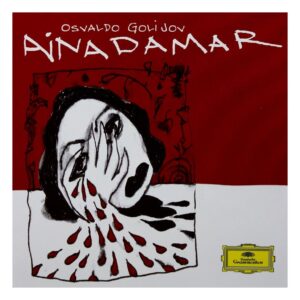 One of the upcoming operas at the Met in New York City this season is Aidanamar by the Argentinian composer Osvaldo Golijov. If you are an opera lover like me, you had a chance to see it in Philadelphia not once, but twice. The Curtis Institute performed it in 2008, directed by Corrado Rovaris, Opera Company of Philadelphia’s conductor, which also performed it at the Academy of Music in 2014. I was fortunate to see both amazing productions.
One of the upcoming operas at the Met in New York City this season is Aidanamar by the Argentinian composer Osvaldo Golijov. If you are an opera lover like me, you had a chance to see it in Philadelphia not once, but twice. The Curtis Institute performed it in 2008, directed by Corrado Rovaris, Opera Company of Philadelphia’s conductor, which also performed it at the Academy of Music in 2014. I was fortunate to see both amazing productions.
Aidanamar, which means fountain of tears in Arabic, tells the story of Federico García Lorca’s last few days before he was assassinated by Franco’s forces on August 19, 1936, in Granada, his hometown, together with a bullfighter and a school teacher. Lorca was one of the first victims of the Spanish Civil War, which started on July 18, 1936, with the insurrection of the military forces in Morocco against the Republican Government. Lorca was killed because he was a homosexual poet who wrote plays about social issues and took his work around rural Spain with his own theater company named La Barraca. He had no military connection whatsoever, no police record, no insurrection intentions. His body has never been found, although it’s believed to be near a natural spring fountain in the Granada countryside.
The opera, with a libretto by David Henry Hwang, was translated into Spanish by Golijov. It is voiced by Lorca’s friend, the actress Margarita Xirgu, who escaped Spain, going first to Cuba and then to Uruguay, as so many other Spaniards did, fleeing the Civil War. She regrets that Lorca never heeded her advice to leave. Lorca is played by a woman in role known as a “trousers role.”  Despite being only eighty minutes long, the opera encompasses three different times: 1927 when Lorca wrote his play Mariana Pineda, about a revolutionary woman who was executed by the repressive government of King Ferdinand VII, perhaps a premonition of Lorca’s own death; 1936, the afore mentioned Lorca’s demise, and 1969 in Montevideo, where Margarita Xirgu laments Lorca’s death as she plays the role of Mariana Pineda. According to Steve Cohen: “Golijov’s score is lush and melodic with Spanish, gypsy and flamenco flourishes” (Broad Street Review, March 15, 2008).
Despite being only eighty minutes long, the opera encompasses three different times: 1927 when Lorca wrote his play Mariana Pineda, about a revolutionary woman who was executed by the repressive government of King Ferdinand VII, perhaps a premonition of Lorca’s own death; 1936, the afore mentioned Lorca’s demise, and 1969 in Montevideo, where Margarita Xirgu laments Lorca’s death as she plays the role of Mariana Pineda. According to Steve Cohen: “Golijov’s score is lush and melodic with Spanish, gypsy and flamenco flourishes” (Broad Street Review, March 15, 2008).
Opera Philadelphia’s production of Aidanamar in 2014 was a big success. In addition to the performance itself there were a series of events to prepare the public for this complicated work. There were flamenco dance classes, lectures, film screenings such as Carlos Saura’s flamenco trilogy, which includes Blood Wedding, Lorca’s play, and readings of Lorca’s poems at different venues such as the Barnes Foundation. The title roles were played by the soprano María Hinojosa Montenegro as Margarita, whose “Wagnerian-styled voice was the highlight of the evening” and mezzo-soprano Marina Pardo as Lorca “who did a noble job presenting a pleasantly warm, rich tone to her voice” (Bryan Buttler, Philadelphia Magazine, February 10, 2014).
 Osvaldo Golijov (b.1960) was born and raised in La Plata, Argentina, where he began his musical studies. Coming from a Jewish family, he emigrated to Israel in 1983 and studied at the Rubin Academy of Music in Jerusalem. Later he lived in Philadelphia and studied with George Crumb at the University of Pennsylvania, where he earned a doctorate in philosophy. He has lived in the United States since then, currently in Brookline, Massachusetts. He has taught music at the College of the Holy Cross among other institutions and has received many honors, including a MacArthur Fellowship (2003), and two Grammy Awards, both for Aidanamar, his only opera. Currently, he’s being praised for the film score of Francis Ford Coppola’s film Megalopolis.
Osvaldo Golijov (b.1960) was born and raised in La Plata, Argentina, where he began his musical studies. Coming from a Jewish family, he emigrated to Israel in 1983 and studied at the Rubin Academy of Music in Jerusalem. Later he lived in Philadelphia and studied with George Crumb at the University of Pennsylvania, where he earned a doctorate in philosophy. He has lived in the United States since then, currently in Brookline, Massachusetts. He has taught music at the College of the Holy Cross among other institutions and has received many honors, including a MacArthur Fellowship (2003), and two Grammy Awards, both for Aidanamar, his only opera. Currently, he’s being praised for the film score of Francis Ford Coppola’s film Megalopolis.
Aidanamar was premiered in Tanglewood in 2003 and has been performed around the world, including in Granada at the Alhambra Nasrid Palace, again conducted by Opera Philadelphia’s conductor Corrado Rovaris. The Metropolitan Opera in New York will perform Aidanamar from October 15-November 9. If you missed it while it was in Philly, you have a chance to see it now, don’t miss it!

Thank you for the informative Epilogo on Golijov AINADAMAR.
Love, Alan and Chuck
You are most welcome. I know you met Osvaldo Golijov. I’d like to hear what it was to work with him.
Love, Concha
Thanks for this – really wish we could have seen it. Looks like it is not on the Live in HD series. You’re so lucky to be able to get to the Met! We actually know Osvaldo Golijov – Alan commissioned him to do a piece for Mendelssohn Club many years ago, before he was famous. So we are especially eager to hear the music. Maybe I will noodle around the web and see what I can find. When you see Alan, you should ask him about it.
XX, Jean
Will do and I’ll keep you posted. XO, Concha
Concha, I enjoyed reading this essay and learned new facts. Hope you’re well!
Cathi
Thanks so much, Cathi.
Concha